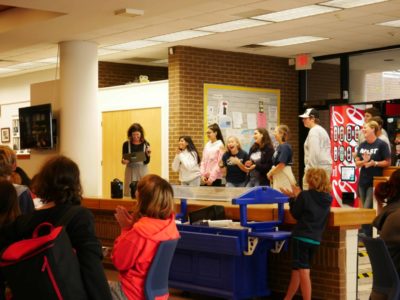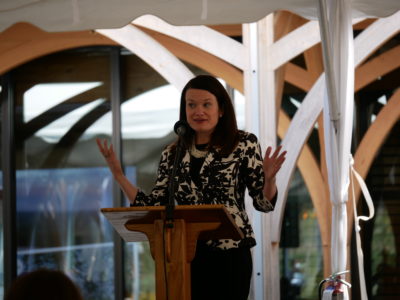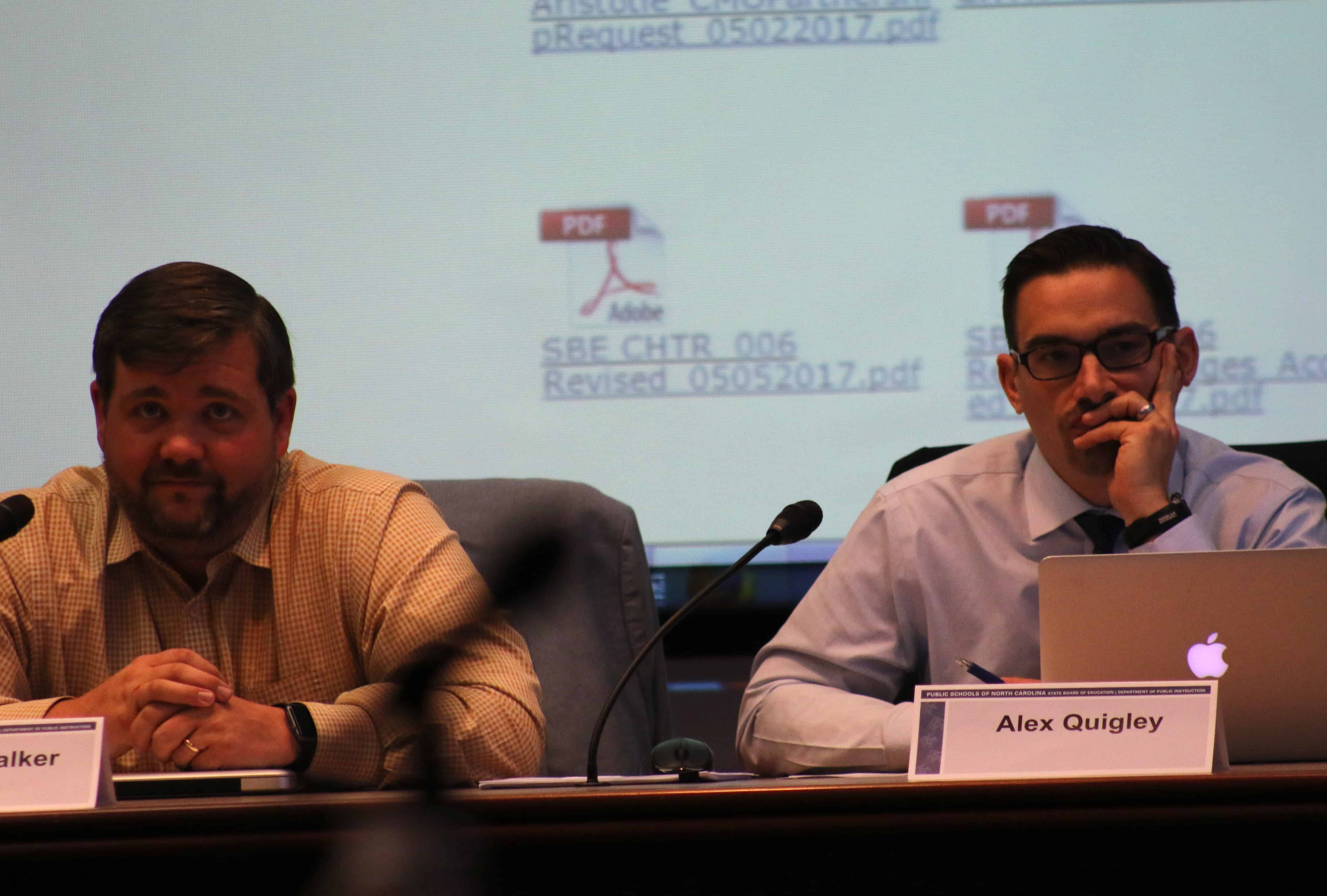The Charter School Advisory Board (CSAB) met Monday in their second-to-last convening of the year-long cycle. The board heard from multiple charter schools — some showcased innovative programs and others defended their competency.
From college prep to arts integration
Leaders of Lincoln Charter School, a K-12 charter in Denver, shared their Dream Big program, which takes students on tours of colleges free of charge.
“The most important part of our charter is college preparation,” executive director Jonathan Bryant said. “That’s how we look at everything that we do, and that’s one of the main reasons for this program.”
Bryant showed a video of current and former students of Lincoln Charter testifying to the program’s effectiveness, saying it helped them think of out-of-state schools as a possibility and exposed them to the best of the best. The trips center around Ivy-league and the top public universities.
One student in the video said that before her experience touring Princeton University, she thought it was out of reach and only for students who did nothing but sit in a library in Harry Potter-like robes. Actually walking through the campus and meeting students helped her realize that top-tier universities are looking for students who want to change the world, like her.
“It’s all about students and their future success,” Melissa Lasarsky, the school’s dean of student life, said. She added that the program also exposes students from Lincoln County to the best and brightest from around the country, since most students on the tours are seniors who are making their final college decisions.
Administrators from Sallie B. Howard School of the Arts and Education, which has been operating in Wilson since 1997, demonstrated how they incorporated drama, music, dance, and visual arts into their curriculum. JoAnne Woodard explained that their mission to educate low-income, minority students would not be possible without this approach. She said their students often show up to school with gaps in their traditional academic skills.
“If (these students) are going to be a part of and cooperate with you in your system, you’re going to have to value the gifts and intelligences that they also bring to the table,” Woodard said. “Right from ground zero, that was what we captured.”
“The arts … provide them with an avenue of being themselves,” a drama teacher at Sallie B. Howard said, adding that students with different backgrounds being able to have multiple interpretations of the material is helpful. She went on to show how, through using the song Mary Had a Little Lamb, a lesson could be taught on English and Language Arts, music, and drama. With each part of the song, she dissected a beginning, middle, and end of a story. Throughout, she made board members show with their facial expressions and body movements, how they thought different characters felt — how a teacher seeing a lamb would feel surprised, how Mary would feel embarrassed after being scorned by the teacher.
An ESL (English as a second language) teacher at the school, Jessica LeCrone said she has seen the school’s opportunities in the arts and art’s presence in teaching every subject especially help students who are English-learners.
“We are constantly integrating all art forms, or all disciplines, because we teach the language of all disciplines,” LeCrone said.
Compliance check-ins
Kestrel Heights Charter School, whose high school the State Board of Education voted to close after 160 students received diplomas without meeting the state’s graduation requirements, appeared before the board Monday.
As part of the State Board’s decision, the charter school — now a K-8 school — is required to hire a professional auditor and report to the CSAB frequently.
The school’s executive director, Mark Tracy, said they have retained an auditor through Leaders Building Leaders and, under contract, should have the audit completed by October.
Board chair Alex Quigley asked Tracy how the rest of the transition is going, and Tracy was up-front about some of the issues the school is facing.
“Many of our families were hopeful that they would remain at Kestrel,” Tracy said. “But now, obviously they will not be able to.”
Tracy said they’ve been working both with other charter schools and Durham Public Schools to get former Kestrel students enrolled, along with trying to find opportunities for former teachers.
A separate charter school in Bertie, Heritage Collegiate Leadership Academy, came before the board to address issues board member Alan Hawkes described as “red flags.”
The school was one of only two charter schools to turn their mandatory audit in late this year, which board member Steven Walker said is inexcusable. There were also concerns around the school’s status as a continually low-performing school, its incorrect projections of student enrollment, and its lack of appropriate staffing — including a lack of an EC teacher despite around 10 percent of its population needing special educational services.
“We have to look at the data that we’re looking at,” Quigley said. “There’s a lot of indicators that are trending in the wrong direction.”
The board voted to hear from the charter school’s board of directors at their next meeting in June before making any further decisions on the fate of the school.
Board’s legislative responses
There are many charter-related pieces of legislation that made the General Assembly’s crossover deadline and remain active for the two-year session.
Cecilia Holden, the State Board’s new legislative liaison, explained some of those bills and their charter school implications to the board. House Bill 779, for example, would allow charter schools to expand by up to 30 percent in a year — instead of 20 percent — without making a material revision to its charter and meeting certain criteria in front of the board.
House Bill 285 would require two hours of suicide prevention training for all faculty that comes in contact with students.
House Bill 806 would require the board to send out notices to parents if a charter is being restructured or closing. Quigley said that although he understands the motive of transparency behind the legislation, he thinks it would unnecessarily slow down important processes.
“It is limiting to our authority and the State Board’s authority to move at, what I would deem a deliberate speed, in a process that’s already delayed,” Quigley said.
House Bill 514 would allow two municipalities near Charlotte, Matthews and Mint Hill, to run charter schools — a model that would be new to the state.
House Bill 800 would reserve 50 percent of a charter school’s seats for children whose parents are employees of a “charter partner,” a for-profit business that supports the school by providing financial support, land, a building, or technological equipment.
The director of the Office of Charter Schools, Dave Machado, said the charter community, from what he hasheard, is not supportive of this measure.
Board member Joseph Maimone said he could not believe this legislative effort. He said that from operating a charter school for 18 years, he has had countless parents try to open up their checkbooks and ask how much they would need to donate for their students to be enrolled.
“In the wording of (House bill) 800, you’re telling people that they can donate x amount of dollars to the school, or land, or some other kind of purchase of equipment, and that’s going to give them preferential enrollment?” Maimone said. “I mean, that blows me away.”
Recommended reading




